

Fannie A. Jackson suffered the same hardships shared by women throughout the South. Her husband had been conscripted for the duration of the war, and she was left to face growing shortages on their small family farm in northern Georgia. She worked in the fields, took care of the animals, and somehow found time to spin and cook for her small children.
Yet despite being Southerners, born and bred, both Jacksons had strong Union sympathies. Mr. Jackson had vowed that he would seek an opportunity to desert and take the family to the North, while Fannie, who opposed secession, was to write, "I felt as if slavery was wrong... a dark spot on American civilization... so foul and evil."
On May 8, 1864, Union forces under General Sherman, on their way to Atlanta, were engaged in a battle near the Jackson farm. Despite having lost everything to the Northerners, Jackson volunteered to nurse the wounded in her tiny house, "a log cabin, ... with only one room." In gratitude, the Union quartermaster gave her a few sacks of supplies - as well as a letter of recommendation to Northern Authorities.
With the departure of Union troops from what was left of her home, Jackson deposited her children with neighbors and on June 12, 1864, presented herself as a nurse in the General Field Hospital of the Union Army of the Cumberland, then stationed in Georgia. She soon gained a reputation for patient and compassionate nursing, one surgeon telling a young amputee that Mrs. Jackson would be a "mother" to him. When this young man died two years later due to lingering effects of his operation, Jackson was asked by his family to write his epitaph.
The Jacksons spent the rest of the war in Chattanooga, Tennesse, where she became head female nurse at the Union General Hospital on Lookout Mountain, and stayed there until September 1865. After decades of trying to obtain a pension, Jackson was awarded one in the 1890's. She died in Kansas in 1925.
